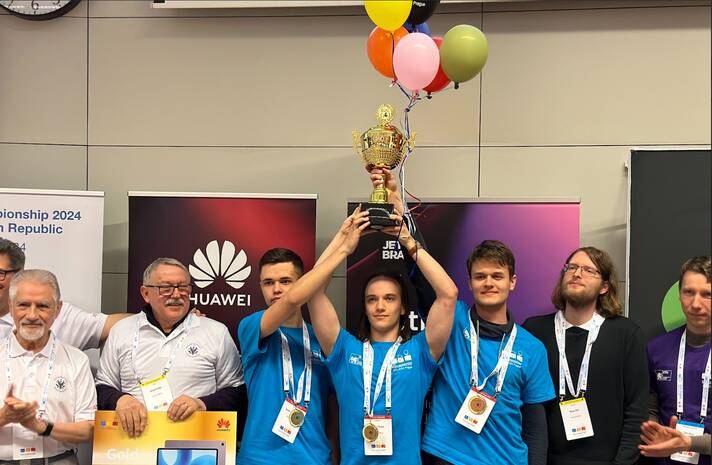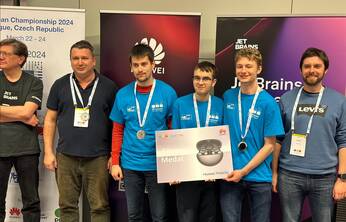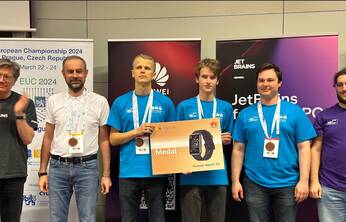A three-member team of students from the University of Warsaw was the only one to solve 9 out of 11 problems during the five-hour competition, leaving behind teams from renowned universities such as Oxford, Cambridge and ETH Zurich. Together with the Polish winners, the teams that came in 2nd to joint 5th place - Zagreb University in Croatia, Taras Shevchenko University in Kiev in Ukraine, Loránd Eötvös University in Hungary, Wroclaw University and École Normale Supérieure in Paris - qualified for the World Finals. The overall ranking can be found via the link https://www.domjudge.org/scoreboard/euc2024/
The International Collegiate Programming Contest (ICPC) is the oldest, largest and most prestigious global programming competition. Universities from all over the world participate, each represented by a team of three students. Their task in the European final was to work together on a single computer to correctly solve as many as possible of 11 programming problems of varying difficulty within a time limit of five hours. They have to read the problem, design a solution, program the algorithm and also debug and test it. All this without using the internet. The problems are evaluated by an automatic system.
The Czech Technical University in Prague (CTUT) was represented in the competition by a team consisting of Yasmine Briefs, Illia Kryvoviaz (both from the Faculty of Electrical Engineering) and Jaroslav Urban (Faculty of Information Technology). Yasmine is from Germany, Illia from Ukraine, Jaroslav from the Czech Republic, so they spoke to each other in English. They were followed by teams from other Czech universities - Masaryk University in 31st and Charles University in 41st place.
Behind every student who achieves any significant success in the ICPC competition are hundreds, or rather thousands, of hours of preparation and training. The really good ones start preparing for programming competitions in high school or even in elementary school.
"The optimal way of preparation consists primarily in real solutions and programming of real competition tasks. It is very useful to supplement the training with both sample problem solving and continuous theoretical preparation. Top competitors train for up to five hours a day," points out Assoc. Tomáš Valla from the Department of Theoretical Informatics at the Faculty of Information Technology of CTU, who prepared the contestants from Czech universities for the competition.
During the finals, it is crucial for the competitors to choose the right tactics, communicate well and allocate their forces correctly. "The key is for the team to know how much time each task will require to solve. Some teams can solve the easiest problem in three minutes. Only the best of the best will be able to solve all eleven problems within the five-hour time limit, but none of the teams in the Prague competition managed to do that," said Dr. Božena Mannová, Director of European Regions of the ICPC and organiser of the European Finals, from the Faculty of Electrical Engineering at CTU.
The patronage of the European Final in Prague was taken over by the Rector of CTU doc. Vojtěch Petráček, Deputy Prime Minister for Digitalization and Minister for Regional Development Ivan Bartoš (Pirates) and Mayor of Prague 6 Jakub Stárek (ODS).
Kazakhstan will host the World Finals
First, the regional rounds of the 2023 competition were held. Three teams from each region in Europe qualified for the finals, which will take place this September in Astana, Kazakhstan. The top five teams from the European finals will then join the other top five teams from around the world in the final competition. This year's first edition of the ICPC European Finals attracted 52 student teams representing 48 universities from 24 European countries. In total, 156 students competed together. The Czech Republic was represented by students from CTU, Charles University and Masaryk University.
The first ICPC competition was held in 1970 at the University of Texas. Since then, the ICPC community has spread around the world and today the competition has more than 400,000 alumni and alumnae. Last year it had 10,000 volunteers and more than 5,000 coaches, and they have organized competitions for 60,000 student team members representing 3,450 universities from 111 countries on every continent.
A recording of the final on Sunday 24 March 2024 can be viewed via the link
https://www.youtube.com/channel/UCDBXshZdICEHr0HSVsLrydA
The video is available here https://www.youtube.com/shorts/3EF-94itlR




